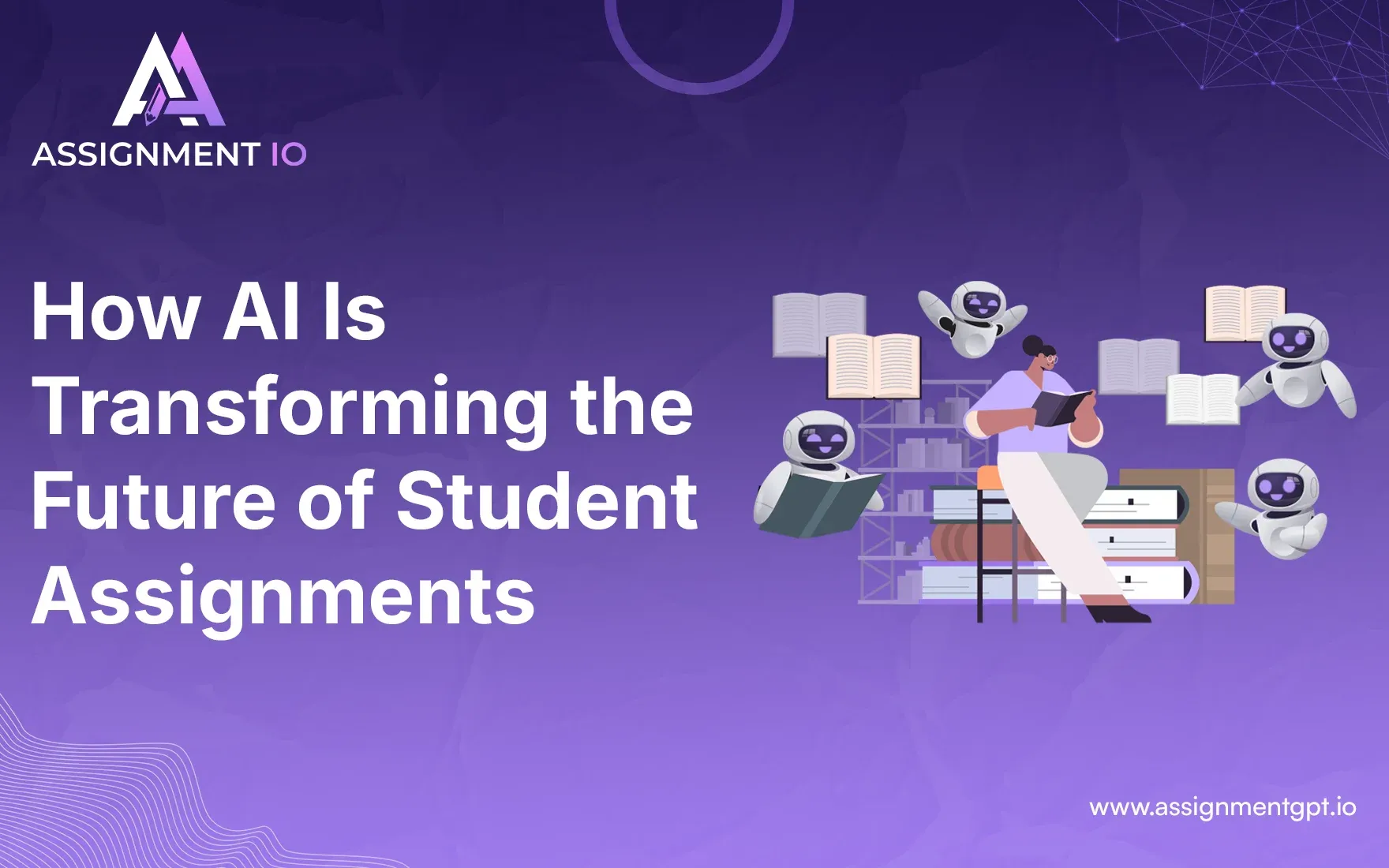How AI Is Transforming the Future of Student Assignments

Kevin Gohil
It's 2 AM, you're staring at a blank document, and that essay due tomorrow feels impossible to start. Sound familiar? If you're a student struggling with how to start an essay introduction or wondering about the perfect essay intro example, you're not alone. But here's the game-changer - artificial intelligence is revolutionizing how students approach assignments, making the writing process more accessible and efficient than ever before.
The days of spending hours on basic research or struggling with how to start an introduction are quickly becoming history. AI tools are transforming student assignments in ways that seemed like science fiction just a few years ago. Let's explore how this technological revolution is reshaping education and what it means for your academic journey.
Ready to discover how AI can transform your assignment writing experience? Let's dive into the current landscape and see what's changing.
The Current State of AI in Student Assignments
The educational landscape has undergone a dramatic transformation in 2025. Artificial intelligence in education has become a cornerstone of modern learning, with AI use being widespread and diverse among students, not just within education but across most aspects of everyday life, according to recent research from Jisc. This isn't just about fancy tools anymore - it's about fundamentally changing how students learn and complete assignments.
Recent statistics reveal some eye-opening trends. Universities using AI tools experience a 12% increase in graduation rates, showcasing the positive impact of AI on education outcomes. This data comes from comprehensive studies conducted throughout 2024 and early 2025, showing concrete evidence of AI's educational benefits.
When it comes to practical application, students are using AI for everything from brainstorming ideas to polishing final drafts. Whether you're figuring out how to write an introduction paragraph or need guidance on how to start a paragraph, AI assistants can provide instant feedback and suggestions that would have taken hours of research just a few years ago.
Key Ways AI Is Transforming Student Assignments
1. Enhanced Research and Information Gathering
Gone are the days of spending entire afternoons in the library digging through dusty encyclopedias. AI-powered research tools can now scan thousands of sources in seconds, providing students with relevant, credible information tailored to their specific topics. These tools don't just find information - they organize it, summarize key points, and even suggest connections between different sources.
For students learning how to write an introduction for an essay, AI can help identify compelling hooks, relevant statistics, and background information that makes introductions more engaging. This doesn't mean the AI writes the introduction for you - rather, it provides the building blocks and guidance to help you craft something uniquely yours.
2. Personalized Writing Assistance
Every student has different strengths and challenges when it comes to writing. AI tutoring systems can now identify individual writing patterns, common mistakes, and areas for improvement. If you consistently struggle with how to start an essay, these systems can provide personalized strategies and templates that match your learning style.
Modern AI writing assistants go beyond simple grammar checking. They can suggest sentence structures, help with transitions between paragraphs, and even provide example of the introduction paragraph formats that align with your specific assignment requirements.
3. Real-Time Feedback and Revision Support
Perhaps one of the most valuable transformations is the availability of instant feedback. Students no longer need to wait days or weeks for professor comments. AI tools can provide immediate suggestions on everything from clarity and coherence to argument structure and evidence support.
This real-time feedback is particularly helpful when students are learning how to make essay writing more effective. Instead of discovering issues after submission, students can identify and address problems during the writing process itself. These improvements sound impressive, but what tangible benefits are students actually experiencing? Let's explore the real-world advantages.
Benefits of AI-Powered Assignment Tools
1. Time Efficiency and Productivity
The most immediate benefit students notice is time savings. Tasks that previously took hours now take minutes. Research that once required multiple library visits can be completed from your dorm room. This efficiency doesn't just save time - it allows students to focus on higher-level thinking and creativity rather than getting bogged down in mechanical tasks.
Students report being able to complete assignments 30-40% faster when using AI assistance appropriately. This doesn't mean cutting corners - it means spending less time on basic research and formatting, and more time on analysis, critical thinking, and original insight development.
2. Improved Learning Outcomes
37% of institutions have experienced higher levels of student satisfaction due to using AI-powered academic advising. This satisfaction stems from more personalized support and better learning outcomes.
AI tools help students understand not just what to write, but why certain approaches work better than others. When learning how to right an essay (and yes, it's "write," not "right" - a common confusion AI can help clarify!), students receive explanations for suggestions, helping them internalize good writing practices.
3. Accessibility and Inclusivity
AI is making quality education support available to students who might not otherwise have access to extensive tutoring or writing centers. Students with learning differences, non-native English speakers, and those attending under-resourced institutions can now access sophisticated writing support that was previously available only to a privileged few.
This democratization of educational support is particularly valuable for students who struggle with traditional assignment formats. AI can provide alternative approaches and accommodations that help all students succeed.
4. Enhanced Creativity and Brainstorming
Contrary to concerns about AI stifling creativity, many students find that AI tools actually enhance their creative thinking. When you're stuck on how to start an essay, AI can suggest multiple approaches, helping you choose the one that best fits your voice and argument.
AI brainstorming tools can generate ideas, suggest unique angles on familiar topics, and help students think outside conventional approaches. This support is particularly valuable during the initial stages of assignment planning and topic development. While these benefits are impressive, it's important to understand that AI integration isn't without challenges. Let's examine what obstacles students and educators are facing.
Challenges and Considerations
1. Academic Integrity Concerns
The biggest challenge facing AI integration in education is maintaining academic integrity. If students use AI to generate their assignments, they do not complete the work themselves, which is not only a plagiarism concern but also impedes their learning capacity.
Educational institutions are grappling with how to distinguish between appropriate AI assistance and academic dishonesty. The line between using AI as a writing tool versus having AI write for you is often blurry and continues to evolve as technology advances.
2. Over-dependence and Skill Development
There's legitimate concern that students might become too dependent on AI assistance, potentially limiting their development of critical thinking and independent research skills. AI can be viewed as an easy out for students, undermining their critical thinking skills.
The challenge is helping students use AI as a learning aid rather than a replacement for their own thinking. Students need to develop their own capabilities while leveraging AI to enhance and accelerate their learning process.
3. Quality and Accuracy Issues
While AI tools are incredibly sophisticated, they're not infallible. Students need to develop skills in fact-checking, source verification, and critical evaluation of AI-generated content. Relying blindly on AI suggestions without understanding or verification can lead to factual errors or inappropriate content.
This challenge emphasizes the importance of digital literacy and critical thinking skills alongside AI familiarity.
4. Equity and Access Concerns
Not all students have equal access to the latest AI tools, which could create new forms of educational inequality. Premium AI services, reliable internet access, and compatible devices aren't universally available, potentially disadvantaging some students.
Educational institutions and policymakers are working to address these access issues, but they remain a significant consideration in AI implementation.
Despite these challenges, the future of AI in education looks promising. Let's explore what we can expect in the coming years.
Future Trends and Predictions
1. Advanced Personalization
The next generation of AI educational tools will offer even more sophisticated personalization. These systems will learn individual student preferences, adapt to different learning styles, and provide increasingly targeted support. Future AI might know that you prefer visual examples when learning essay introduction techniques or that you work better with structured outlines.
2. Integration with Learning Management Systems
AI will become seamlessly integrated with existing educational platforms. Instead of using separate AI tools, students will have AI assistance built directly into their course management systems, making support more accessible and contextually relevant to specific assignments and courses.
3. Collaborative AI Learning
Future AI systems will facilitate better collaboration between students, helping form study groups, match students with complementary skills, and coordinate group projects more effectively. This collaborative approach will combine the benefits of AI assistance with peer learning.
4. Predictive Analytics for Student Success
AI will increasingly be used to predict student challenges before they become problems. By analyzing writing patterns, engagement levels, and performance trends, AI systems will alert students and instructors to potential issues early, allowing for proactive intervention.
These future developments sound exciting, but how can students make the most of current AI tools? Let's explore some practical strategies.
Best Practices for Students Using AI
1. Understand Your Institution's Policies
Before using any AI tools for assignments, thoroughly understand your school's policies on AI use. Some institutions have specific guidelines about when and how AI can be used, while others may prohibit certain applications entirely. When in doubt, ask your instructors directly about their expectations.
2. Use AI as a Learning Partner, Not a Replacement
The most effective approach is treating AI as a sophisticated tutoring assistant rather than a shortcut to completed assignments. Use AI to understand concepts, generate ideas, and get feedback on your work, but ensure the final product represents your own thinking and learning.
3. Develop Critical Evaluation Skills
Always fact-check AI-generated information and suggestions. AI tools can make mistakes, provide outdated information, or offer suggestions that don't fit your specific context. Developing strong critical thinking skills will help you maximize AI benefits while avoiding potential pitfalls.
4. Maintain Transparency
When appropriate and allowed by your institution, be transparent about your AI use. This might involve noting in your assignments when you've used AI for research assistance or brainstorming, demonstrating responsible and ethical AI integration.
5. Focus on Learning, Not Just Completion
Use AI tools in ways that enhance your understanding rather than simply completing assignments faster. If you're learning how to start an essay introduction, use AI to understand why certain approaches work rather than just copying suggested openings. Understanding best practices is crucial, but what about the tools themselves? Let's look at some popular AI platforms students are using today.
Impact on Educational Systems
1. Curriculum Adaptation
Educational institutions are adapting their curricula to include AI literacy alongside traditional academic skills. The integration of artificial intelligence in education requires students to understand not just how to use AI tools, but how to use them responsibly and effectively.
This adaptation includes teaching students about the ethical implications of AI use, how to verify AI-generated information, and how to maintain academic integrity while leveraging AI assistance.
2. Assessment Evolution
Traditional assessment methods are evolving to account for AI capabilities. Educators are developing new forms of evaluation that focus on critical thinking, analysis, and creativity rather than information regurgitation or basic writing mechanics. This shift emphasizes skills that remain uniquely human while acknowledging that certain routine tasks can be AI-assisted.
3. Teacher Training and Support
Student use far exceeds that of instructors according to recent surveys. Educational institutions are investing heavily in training educators to understand and effectively integrate AI tools into their teaching practices. This training helps ensure that AI integration enhances rather than disrupts the educational process.
4. Infrastructure and Policy Development
Schools and universities are developing comprehensive AI policies, upgrading technological infrastructure, and creating support systems to help both students and faculty navigate the AI-enhanced educational landscape effectively.
As we look toward the future, it's clear that AI will continue to transform education. Let's wrap up with some final thoughts on what this means for students.
Conclusion
AI is transforming student assignments, revolutionizing everything from essay introductions to complex research. Institutions using AI tools report higher graduation rates and improved student satisfaction, as these technologies create more personalized learning experiences. However, students must balance AI assistance with academic integrity, using it to enhance - not replace - their critical thinking and creativity. Looking ahead, AI will become even more integrated and personalized, helping learners write, research, and problem-solve effectively. The key is embracing AI as a partner in learning, ensuring it supports skill development rather than completing tasks for you.
FAQs
1. How is AI used in student assignments?
AI is used to assist students with research, writing, grammar correction, idea generation, citation management, and real-time feedback. It helps streamline the assignment process while improving writing quality and learning outcomes.
2. Can AI help me write better essays?
Yes. AI tools can suggest structure, improve grammar, offer examples, and help you organize your arguments. They don't replace your writing but enhance it by offering suggestions based on best writing practices.
3. Is using AI for homework cheating?
Not necessarily. Using AI for support, such as brainstorming ideas, checking grammar, or improving clarity, is typically allowed. However, submitting fully AI-generated work without attribution may violate academic integrity policies. Always follow your institution’s guidelines.
4. What are the benefits of using AI in assignments?
Key benefits include faster research, personalized writing assistance, instant feedback, enhanced creativity, and improved academic performance. AI makes the assignment process more efficient and accessible.
5. Can AI tools help with different types of assignments?
Yes. AI can assist with essays, reports, presentations, case studies, coding tasks, and even creative writing. Many tools adapt based on assignment type and subject area.
Latest Blog's
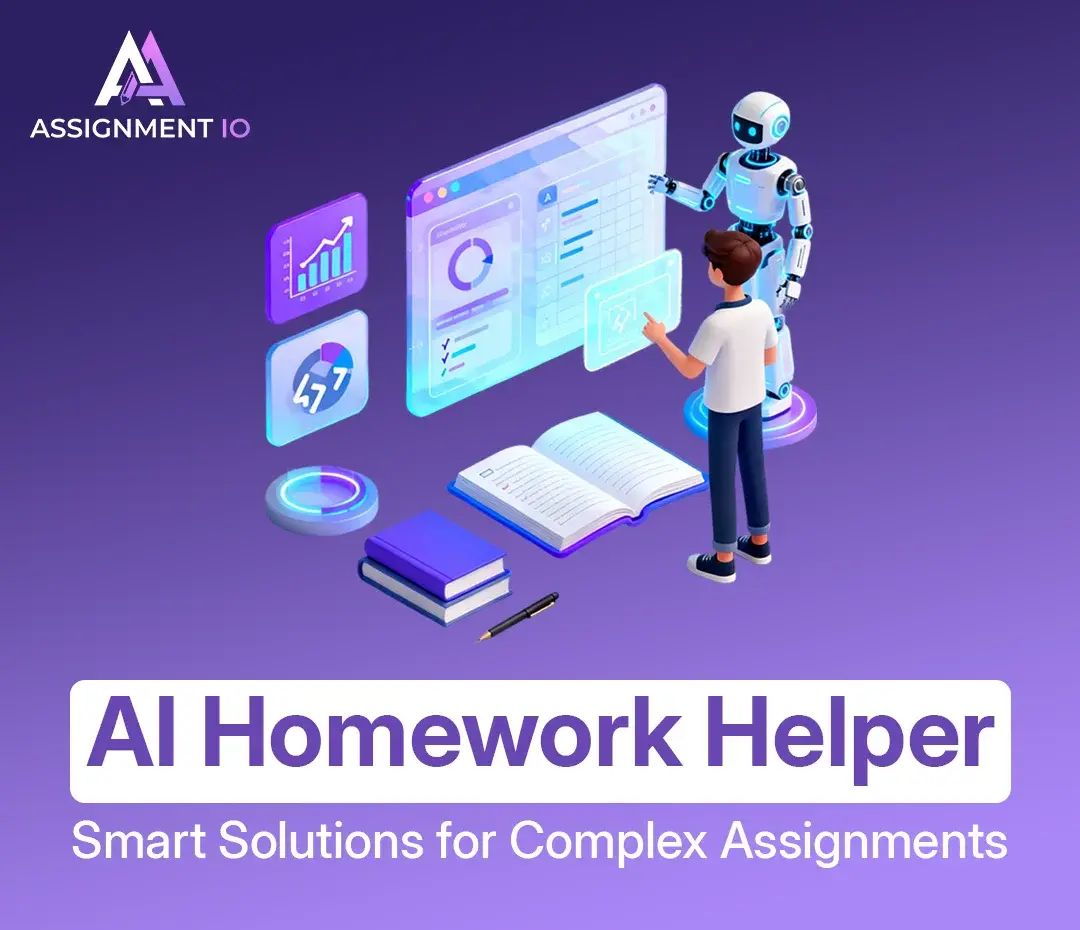
AI Homework Helpers offer fast solutions, personalized learning, and round-the-clock study support for students in every subject.

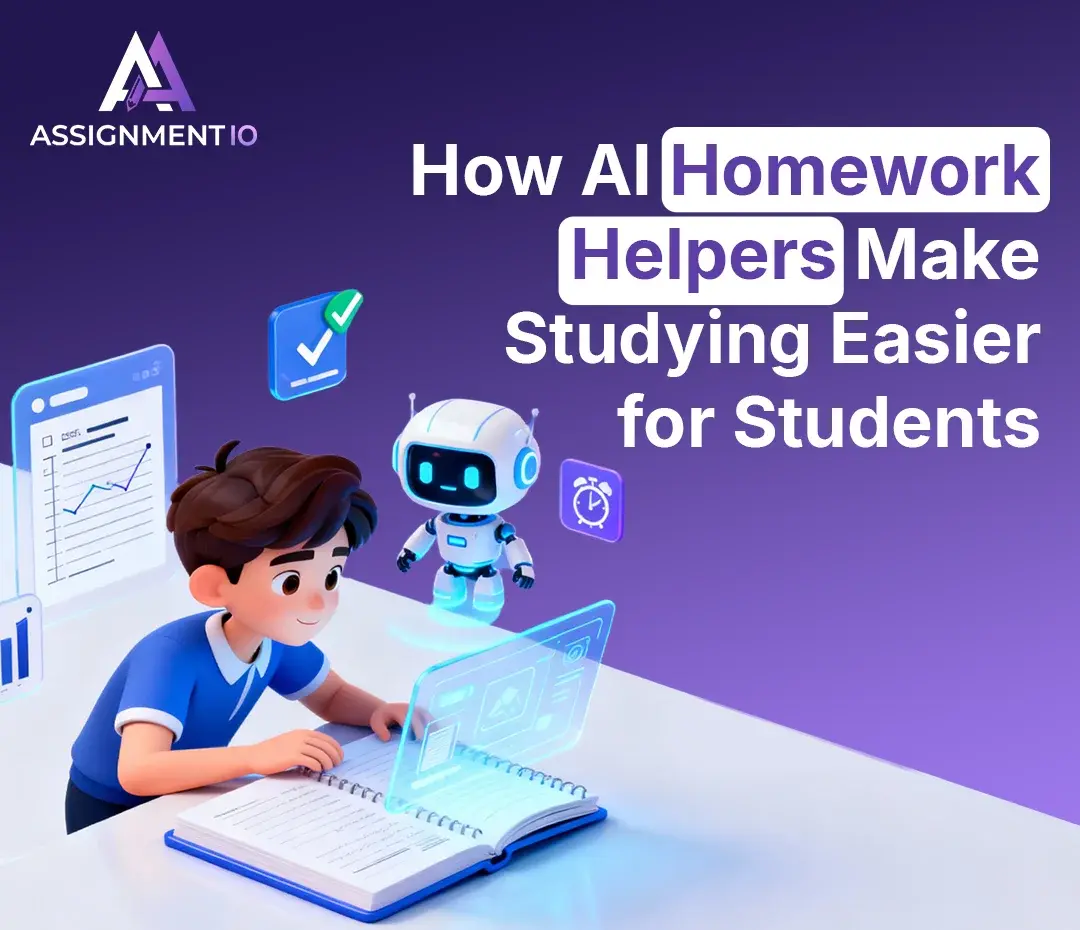
Master exams with superior scores and less study time. Step-by-step tips using ChatGPT, Khanmigo, and Quizlet.

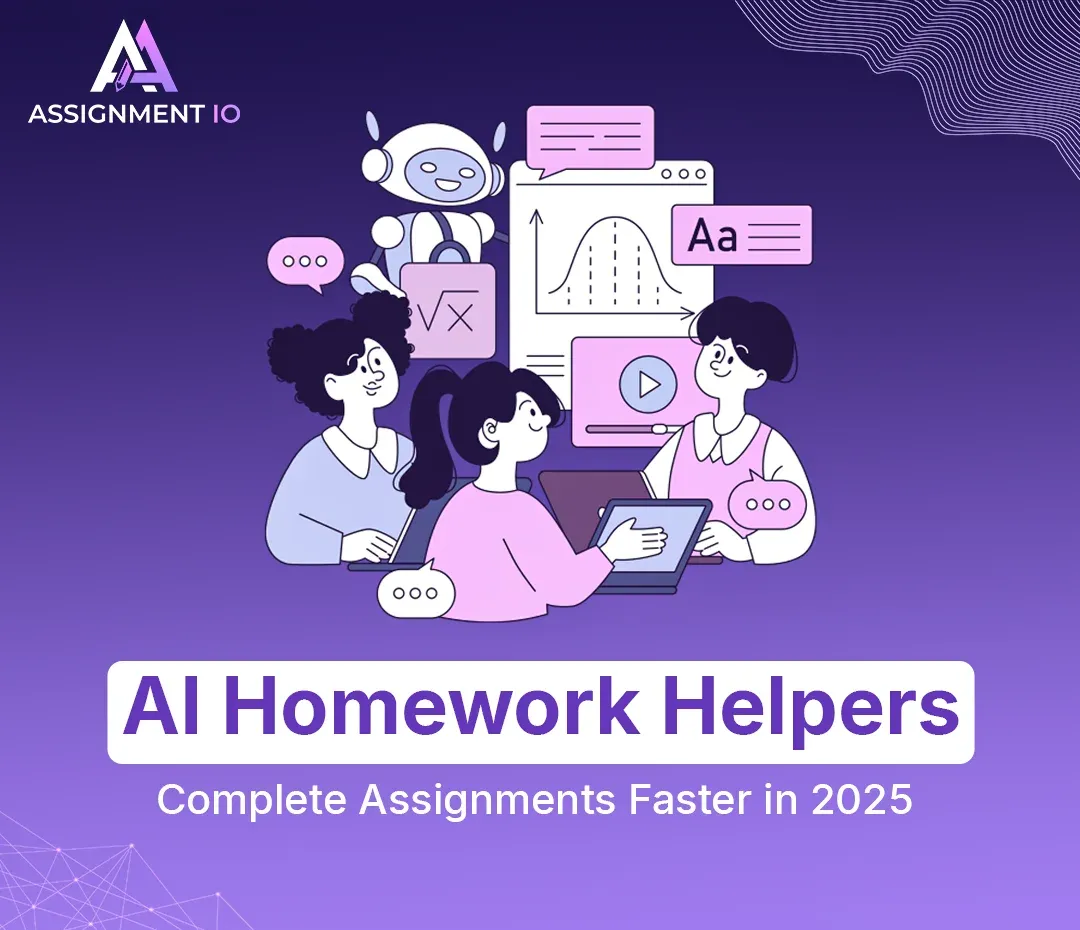
AI homework helpers streamline research, writing, and studying so students learn faster and complete assignments with less stress.

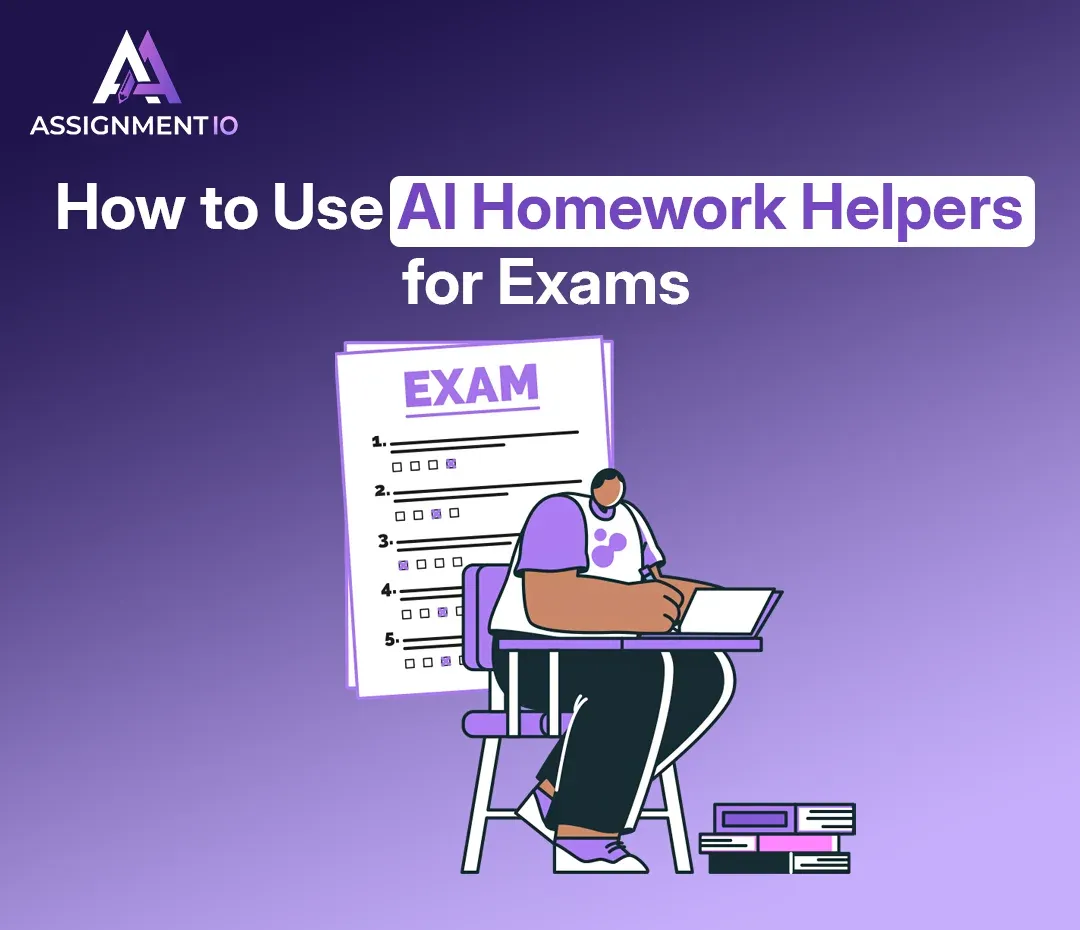
Master exams with superior scores and less study time. Step-by-step tips using ChatGPT, Khanmigo, Quizlet.

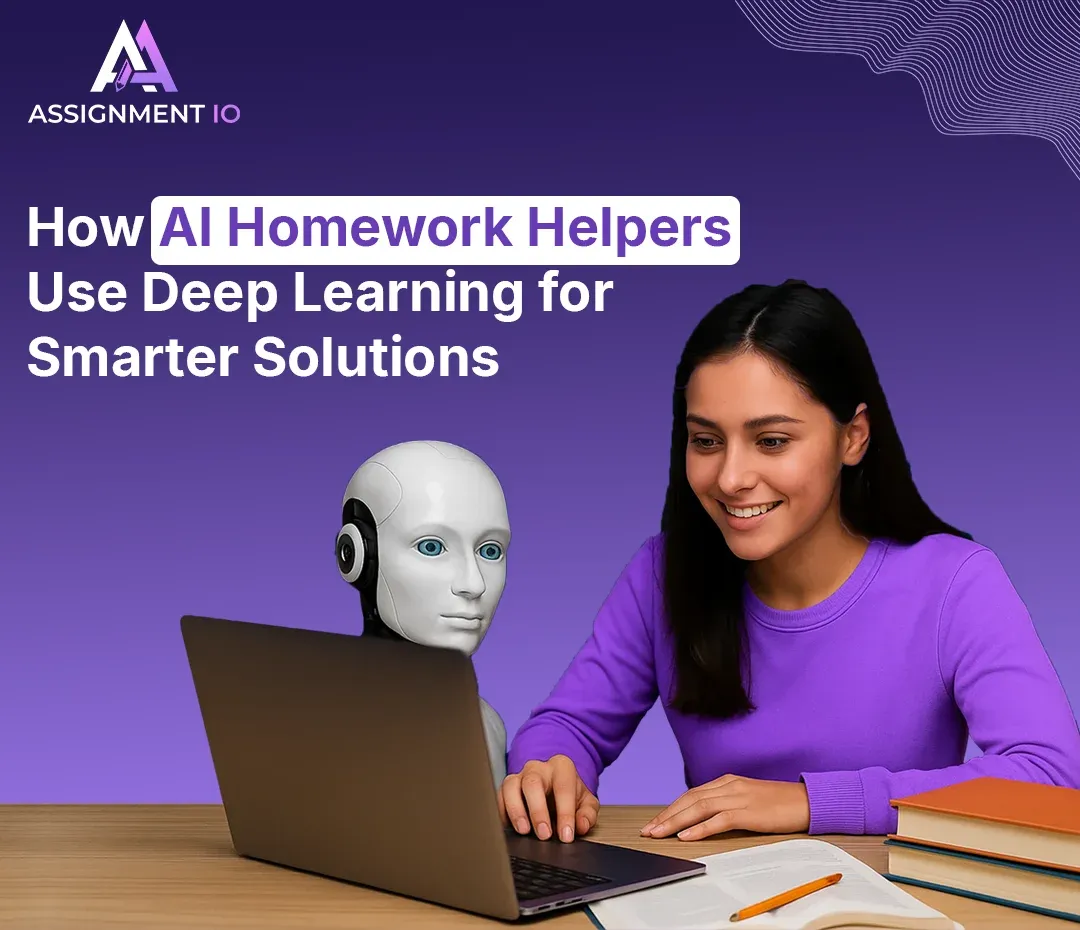
How deep learning makes AI homework helpers smarter, faster, and more personalized for students.

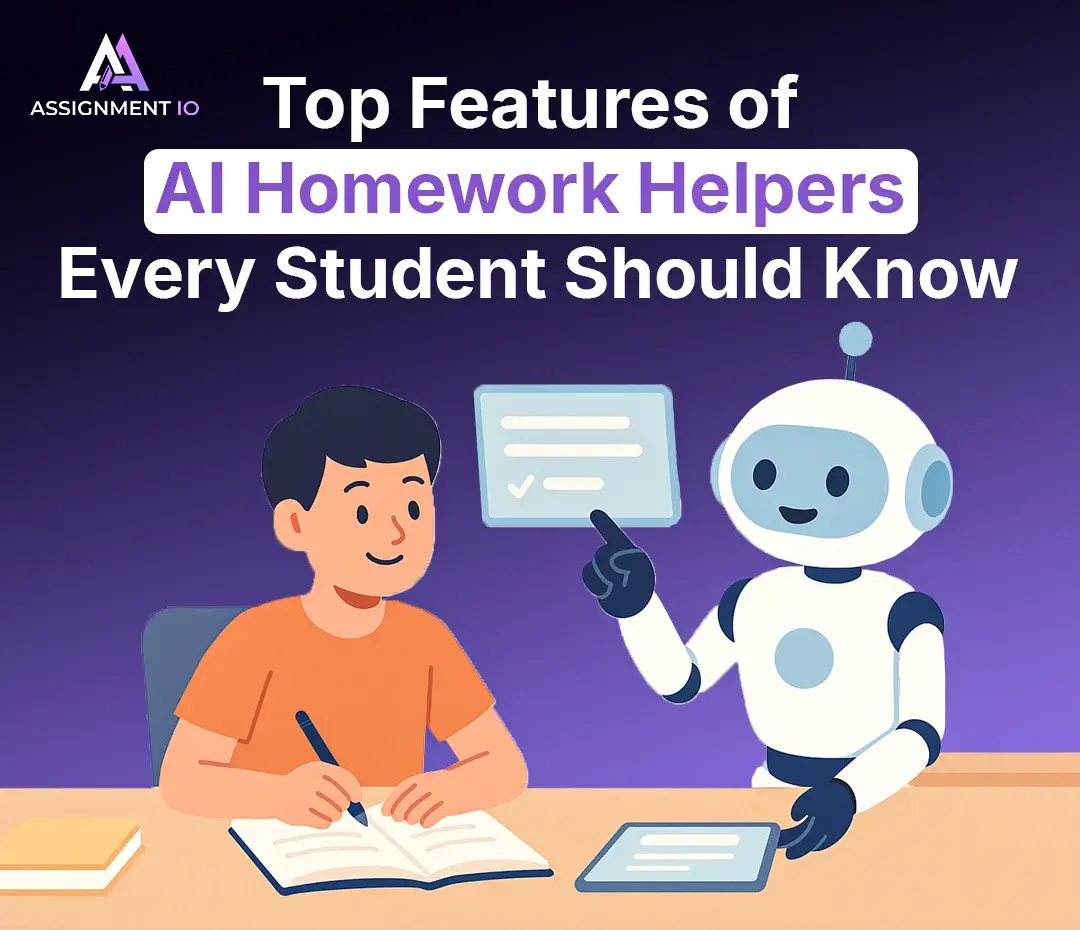
How AI homework helpers save time, boost learning, and provide personalized study support.

